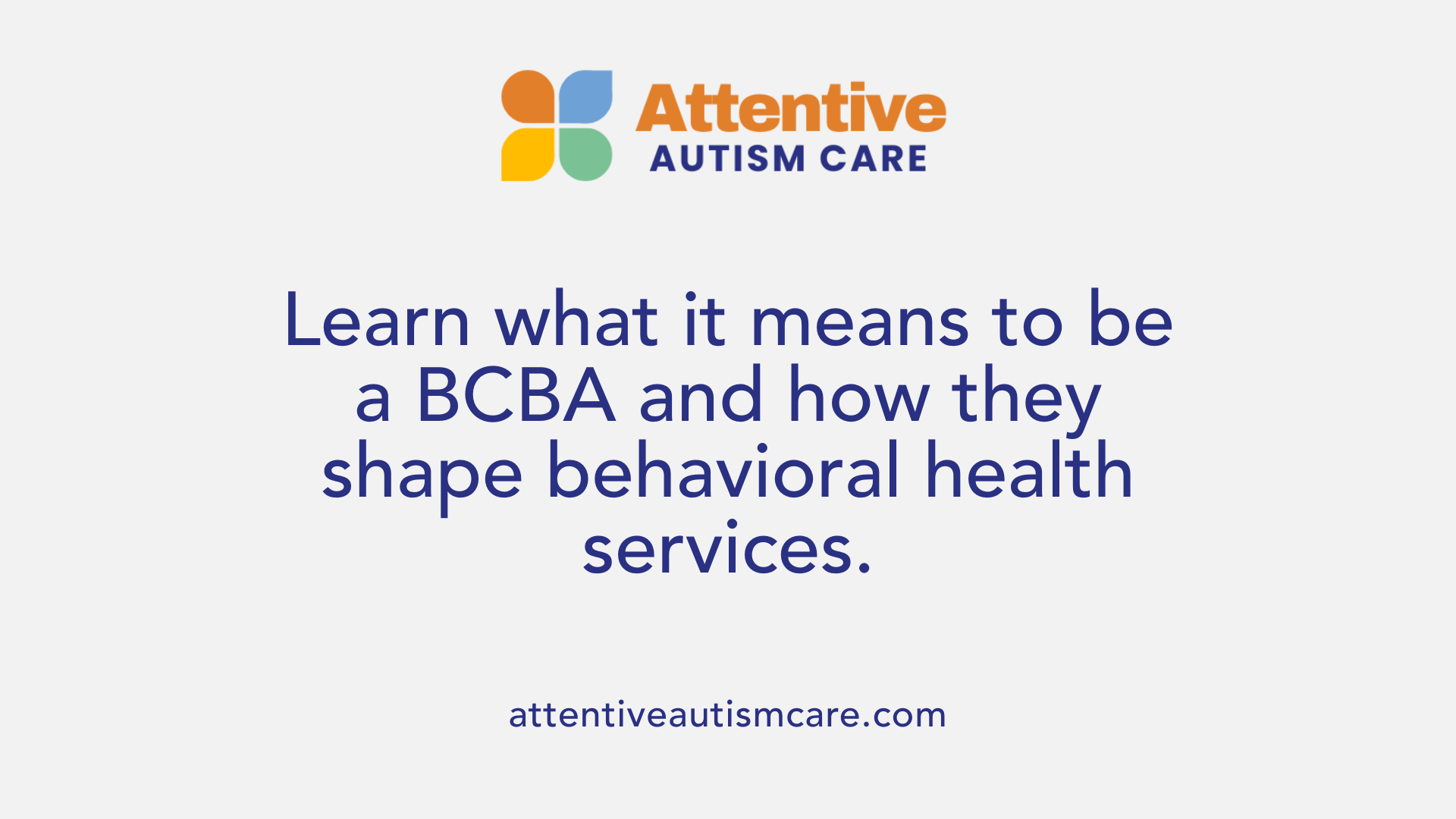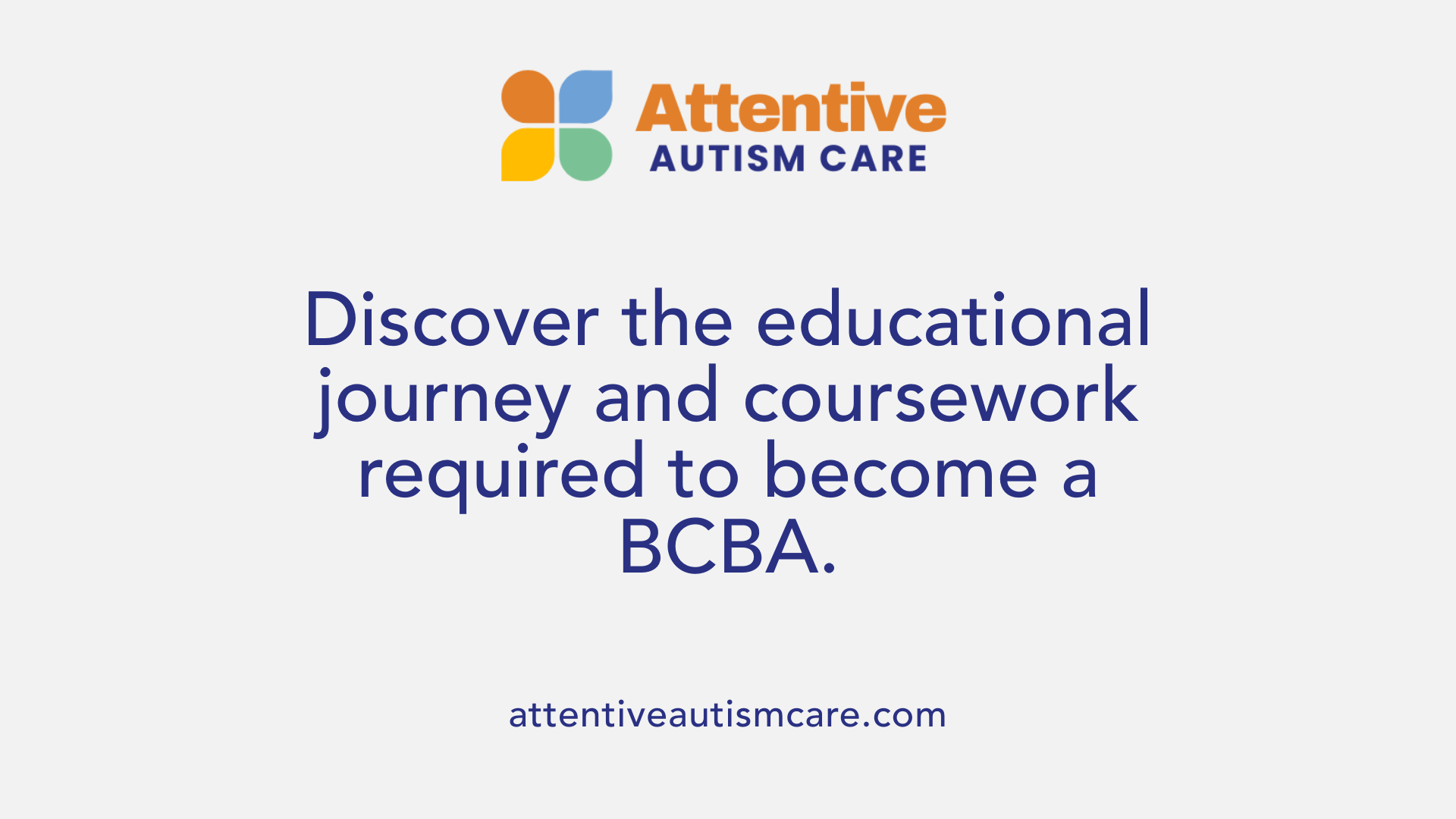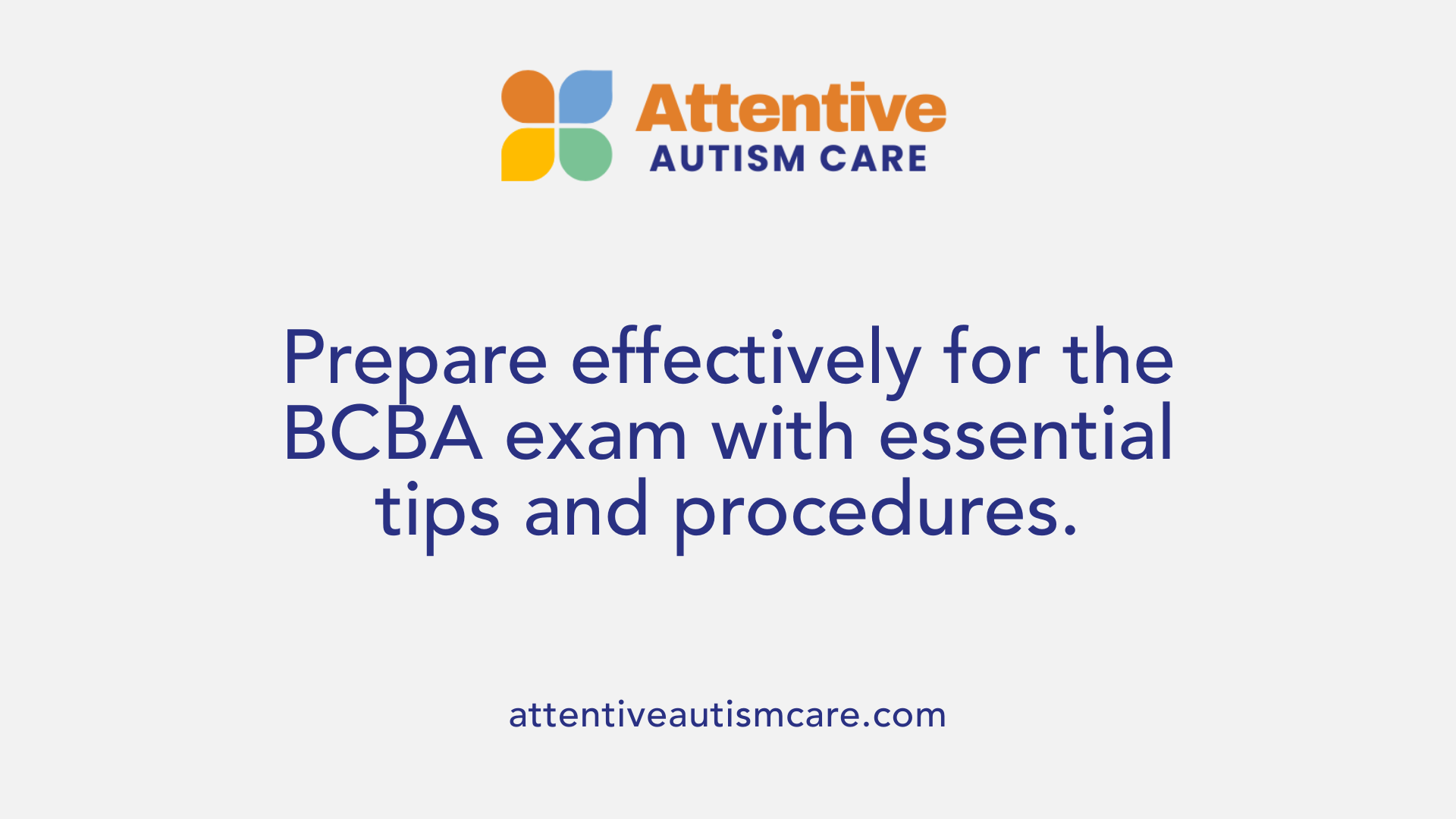How To Become A Board Certified Behavior Analyst (BCBA)
Your Pathway to a Rewarding Career in Behavior Analysis

Embarking on the Journey to Becoming a BCBA
Becoming a Board Certified Behavior Analyst (BCBA) is a structured process that combines educational achievement, supervised practical experience, and successful examination. This certification not only affirms your expertise in applied behavior analysis but also opens doors to a fulfilling career helping individuals improve their lives through evidence-based interventions. This article guides you through each step of the pathway, clarifies certification requirements, and provides insights into career prospects.
Understanding the BCBA Certification and Its Role

What is a BCBA?
A BCBA, or Board Certified Behavior Analyst, is a graduate-level credential in the field of applied behavior analysis. This certification signifies that an individual has met rigorous educational, experiential, and examination standards set by the Behavior Analyst Certification Board (BACB). BCBAs are qualified to independently deliver behavior-analytic services, including conducting assessments, developing intervention plans, supervising other professionals such as Registered Behavior Therapists (RBTs) and Behavior Analysis Certified Assistants (BCaBAs), and engaging in research and ethical practices.
Responsibilities of a BCBA
A BCBA’s responsibilities are diverse and vital to the successful application of behavior analysis. They perform functional assessments to understand the reasons behind specific behaviors. Based on these assessments, they design tailored intervention programs aimed at promoting positive behavior change.
Supervision is a core aspect of their role; BCBAs oversee the work of support staff like RBTs, ensuring interventions are properly implemented and progress is monitored effectively. Additionally, BCBAs work collaboratively with families, educators, and other professionals to deliver comprehensive services. Their work is rooted in scientific evidence, focusing on improving the quality of life for individuals with behavioral challenges.
Difference Between BCBA and Other Related Certifications
The BCBA certification differs from other credentials such as the BCaBA and RBT. The BCaBA (Board Certified Assistant Behavior Analyst) holds a bachelor’s degree and works under the supervision of a BCBA, assisting with assessment and intervention tasks.
The RBT (Registered Behavior Technician), on the other hand, is a paraprofessional certification that requires less formal education, focusing primarily on implementing behavior-analytic services under supervision.
While all these roles contribute to behavior support, the BCBA is distinguished by its advanced level of training, independence in practice, and leadership responsibilities in designing and evaluating intervention strategies.
| Certification | Educational Level | Scope of Practice | Supervision Requirements |
|---|---|---|---|
| BCBA | Master’s or higher | Independent practitioner, creates treatment plans, supervises staff | Supervised fieldwork (1500-2000 hours), exam required |
| BCaBA | Bachelor’s | Assists BCBAs under supervision, implements interventions | Supervised experience, no independent practice |
| RBT | High school diploma or equivalent | Implements behavior plans under supervision | Ongoing supervision required |
Understanding these distinctions helps clarify the pathway and responsibilities associated with each certification, ensuring individuals are prepared for their respective roles in behavior analysis.
Educational Pathways and Certification Prerequisites

What educational background is necessary to become a BCBA?
The path to becoming a Board Certified Behavior Analyst begins with establishing a solid educational foundation. The minimum requirement is earning a bachelor’s degree, preferably in behavioral sciences such as psychology, education, or related fields. This undergraduate degree sets the stage for advanced specialization in behavior analysis.
Following the bachelor’s degree, prospective BCBAs must pursue graduate-level education. Specifically, a master’s degree in applied behavior analysis (ABA) or a closely related program accredited by recognized organizations like the Association for Behavior Analysis International (ABAI) is essential. The master’s program must include specific coursework verified by the BACB or completed through a Verified Course Sequence (VCS). This step ensures candidates gain both theoretical knowledge and practical skills aligned with industry standards.
What coursework is required for BCBA certification?
Candidates seeking BCBA certification must complete comprehensive graduate coursework that covers fundamental areas of behavior analysis. This coursework generally includes topics such as ethics, principles of behavior, measurement and assessment, intervention strategies, experimental design, and research methods.
The coursework requirements are strictly outlined by the BACB, with a typical program including at least 315 hours of classroom instruction. The coursework can be delivered by programs accredited by ABAI or through a verified course sequence, which assures that the content meets the necessary standards for certification.
Accredited programs and Verified Course Sequences
To ensure quality and compliance, candidates are encouraged to enroll in ABAI-accredited graduate programs or complete a Verified Course Sequence (VCS). An accredited program inherently meets all BACB coursework standards, offering structured, rigorous training.
A VCS is a specific set of courses recognized by the BACB that collectively satisfy the coursework requirements for BCBA certification. It provides flexibility for candidates who have completed relevant coursework independently but want to ensure their education aligns with certification standards.
In summary, aspiring BCBAs should pursue a licensed or accredited graduate program in behavior analysis, complete the necessary coursework in ethics, assessment, and intervention, and ensure their education pathway is recognized either through accreditation or verified course sequences. This comprehensive educational background forms the backbone of a successful career in applied behavior analysis.
Supervised Experience and Fieldwork Requirements
 For aspiring BCBAs, gaining practical experience through supervised fieldwork is a crucial step in the certification process.
For aspiring BCBAs, gaining practical experience through supervised fieldwork is a crucial step in the certification process.
Candidates must complete between 1,500 and 2,000 hours of supervised fieldwork in applied behavior analysis. This extensive hands-on experience is designed to prepare individuals with the real-world skills necessary to practice independently. During this period, candidates engage in various activities such as conducting assessments, developing and adjusting behavior intervention plans, and monitoring behavioral progress.
The activities involved in supervised fieldwork encompass a wide range of essential tasks. These include designing and implementing behavior strategies, collecting and analyzing data, and collaborating with clients, families, and other professionals. Such activities allow candidates to apply theoretical knowledge practically and develop their clinical judgment.
Supervision guidelines outlined by the Behavior Analyst Certification Board (BACB) specify that all practical work must be overseen by a qualified BCBA. Supervisors are responsible for providing consistent feedback, ensuring ethical standards are maintained, and verifying that the candidate demonstrates competent practice in various behavior-analytic procedures.
By fulfilling these supervised experience requirements, candidates ensure they are well-equipped for the BCBA exam and future independent practice. This phase of training is essential for consolidating skills and understanding the complexities involved in applied behavior analysis.
Preparation and Examination Process

What does the BCBA certification exam entail?
The BCBA exam is a critical step in earning the credential and is designed to assess a candidate’s knowledge of applied behavior analysis (ABA). It is a four-hour, computer-based test featuring 185 multiple-choice questions. These questions cover a range of topics, including behavior principles, measurement, assessment, intervention strategies, ethics, and supervision. The exam content aligns with the BACB’s Task List, ensuring that all foundational and practical skills are evaluated.
Results are scored based on a scaled score system, with a passing score set at 400 points out of 500. This standardized scoring ensures fairness across different exam administrations. Successful candidates receive their scores immediately at the testing site, with official results emailed within approximately one week.
How can candidates prepare for the BCBA exam?
Effective preparation is essential for passing the exam. Candidates should start by thoroughly reviewing the BACB’s official exam outline and content areas. Many universities and organizations offer dedicated study resources, including practice exams, review courses, and comprehensive study guides. For instance, Northeastern University provides online coursework, practicum opportunities, and exam prep courses tailored to the BACB standards.
Practicing with sample questions helps familiarize candidates with the exam’s format and time constraints. Study strategies such as forming study groups, establishing consistent study schedules, and focusing on weak areas can improve confidence and performance.
Many candidates also utilize supplemental materials like flashcards, webinars, and mobile apps to reinforce knowledge. Carefully reviewing the BACB’s handbook and task list ensures familiarity with the exam scope and reduces test anxiety.
Application procedures
Applying for the BCBA exam involves submitting an online application through the BACB’s website, along with proof of educational qualifications, supervised experience, and relevant coursework. Applicants must demonstrate they meet the criteria—such as obtaining a master’s degree in a qualifying program and completing the required supervised fieldwork hours.
After approval, candidates can schedule their exam at authorized Pearson VUE testing centers worldwide. They must pay the applicable exam fee and adhere to testing policies, including rescheduling and cancellation procedures.
Preparing adequately and understanding the exam structure increases the chances of success and helps new BCBAs confidently step into their professional roles in behavior analysis.
Steps to Obtain Certification and Professional Practice
What are the steps to becoming a BCBA?
The journey to becoming a Board Certified Behavior Analyst starts with foundational education. The first step is earning a relevant undergraduate degree in fields such as psychology, education, or applied behavior analysis. This is followed by completing graduate coursework that meets the standards set by the Behavior Analyst Certification Board (BACB). Typically, this involves obtaining a master's degree from an accredited program or completing a Verified Course Sequence if the initial degree does not focus specifically on behavior analysis.
Once coursework is completed, candidates need to gather practical experience. This involves completing 1,500 to 2,000 hours of supervised fieldwork, during which they engage in activities like assessments, designing intervention programs, and supervising RBTs under the guidance of a qualified BCBA.
The next step is to submit an application to the BACB, including proof of education, supervised experience, and payment of the application fee. After approval, candidates are eligible to schedule and take the BCBA exam, a rigorous four-hour, 185-question test that evaluates their knowledge and practical skills.
Passing the exam is the final certification step. Afterward, individuals must obtain state licensure if required, which often involves submitting additional documentation and fulfilling state-specific requirements. Maintaining certification necessitates ongoing professional development, including continuing education units (CEUs) every two years, and adhering to ethical standards.
This pathway ensures that BCBAs are well-equipped to provide effective behavior-analytic services and uphold high professional standards.
Career Opportunities, Salary, and Ongoing Certification Maintenance

What are common job roles and settings for BCBAs?
Board Certified Behavior Analysts (BCBAs) work in diverse environments, including schools, clinics, hospitals, and private practices. They often serve children with developmental disorders such as autism spectrum disorder, but also work with adults in rehabilitation centers or organizational settings. Their primary responsibilities include conducting assessments, designing and implementing behavior intervention plans, supervising Registered Behavior Technicians (RBTs), and monitoring client progress.
What is the average salary range for a travel BCBA?
Travel BCBAs enjoy a flexible working arrangement that involves visiting multiple locations or clients. Their compensation typically ranges from $1,700 to $2,500 per week, which can add up to approximately $74,000 to $95,000 annually. Top earners, especially those with extensive experience and in high-demand areas, may make closer to $132,500 per year, reflecting their specialized skills and the demand for behavior-analytic services.
How long does it take to become a BCBA?
The journey to becoming a BCBA usually takes about 2 to 4 years. This timeframe depends heavily on prior educational background, the pace of completing graduate coursework, supervised fieldwork hours, and exam preparation. Most candidates complete their master’s degree and fulfill supervised experience requirements within this period before sitting for the certification exam.
Is becoming a BCBA difficult?
The BCBA certification process is rigorous. The exam covers a broad spectrum of content, including behavioral principles, assessment techniques, ethics, and intervention processes. Success requires diligent study and practical experience. However, many candidates find success through preparation courses, study guides, and practice exams. With consistent effort, most pass on their first attempt.
Maintaining certification and career growth
Once certified, BCBAs must recertify every two years by completing continuing education units (CEUs), often requiring 32 hours of ongoing learning and training, including a focus on ethics and supervision. This ongoing professional development ensures BCBAs stay current with best practices and advances in the field, supporting continuous career growth and expertise.
| Aspect | Details | Additional Notes |
|---|---|---|
| Job Settings | Schools, clinics, hospitals, private practice, organizational settings | Wide range of environments for diverse client needs |
| Average Salary | $74,000 – $95,000 annually | Travel BCBAs can earn more with flexible, location-independent work |
| Certification Duration | 2 – 4 years | Includes education, supervised fieldwork, and exam preparation |
| Recertification | Every 2 years | 32 CEUs required, ethics compliance essential |
This pathway offers significant opportunities for individuals passionate about behavior analysis, with competitive compensation and the satisfaction of making a meaningful impact on clients’ lives.
Maintaining Certification and Professional Development
Recertification Process
Once a BCBA is certified, maintaining that certification is an ongoing commitment. Every two years, BCBAs must undergo a recertification process to ensure they continue to meet professional standards. This involves submitting a recertification application through the BACB and paying any applicable fees. Failure to recertify on time can result in the loss of certification, emphasizing the importance of staying current.
Continuing Education Requirements
A core part of recertification is completing continuing education units (CEUs). BCBAs are required to earn at least 32 CEUs every two years to remain certified. These CEUs can be earned through various activities such as attending workshops, seminars, or specialized courses related to applied behavior analysis. Additionally, there are specific requirements for CEUs in ethics and supervision to promote ongoing professional integrity.
Ethical Standards and Ongoing Learning
Ongoing learning isn't just about fulfilling CEU requirements—it also involves staying updated with the latest ethical standards. The BACB emphasizes the importance of ethical practices in behavior analysis. BCBAs are expected to periodically review and adhere to the BACB Professional and Ethical Compliance Code. This ensures that all practitioners uphold high standards of professional conduct and continue to improve their skills throughout their careers.
Embarking on a Rewarding Path in Behavior Analysis
Becoming a BCBA entails a rigorous yet rewarding process that combines education, practical experience, and examination success. It offers a pathway to a dynamic career helping individuals improve their behaviors and quality of life. By understanding the steps involved and preparing thoroughly, aspiring behavior analysts can achieve their goals and enjoy a fulfilling career in this impactful field.
References
- Board Certified Behavior Analyst
- How to Become a Board-Certified Behavior Analyst (BCBA)
- How to Become a Board Certified Behavior Analyst (BCBA)
- BACB - Behavior Analyst Certification Board
- Board Certified Behavioral Analyst Career Overview
- How To Become a Board Certified Behavior Analyst
- What is a BCBA? Your Guide to the BCBA Certification & ...
- How to Become a BCBA - Arizona Online
- Online Behavior Analyst Certificate
- BCBA® Certification & Requirements: A Step-by-Step Guide




































































































